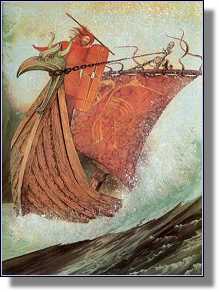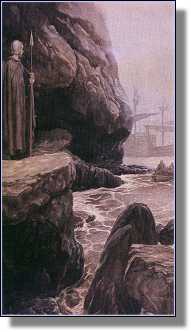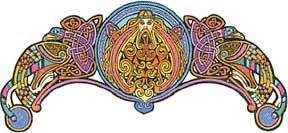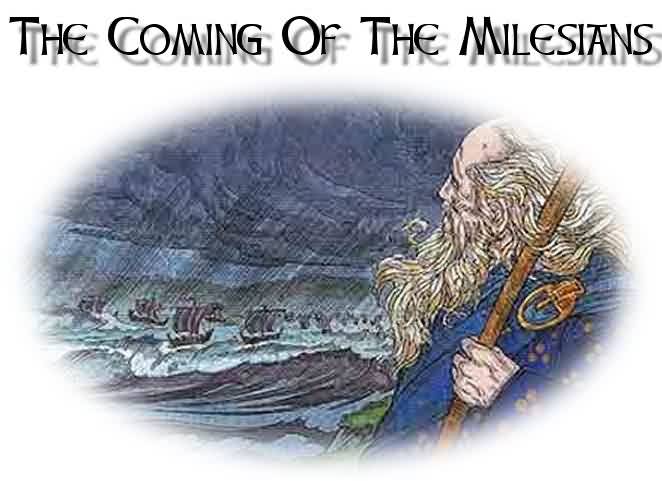|
 The sixteenth century scholar, O'Flaherty, fixes the Milesian invasion of
Ireland at about 1000 B.C. - the time of Solomon.
It is proven that the Celts
whenever they arrived, had, before the dawn of history, subjugated the Germanic
tribes and established
themselves in Central Europe. At about the date we have
mentioned, a great Celtic wave, breaking westward over the Rhine,
penetrated
into England, Scotland, and Ireland. Subsequently another wave of Celts swept
over the Pyrenees into the Spanish Peninsula. The sixteenth century scholar, O'Flaherty, fixes the Milesian invasion of
Ireland at about 1000 B.C. - the time of Solomon.
It is proven that the Celts
whenever they arrived, had, before the dawn of history, subjugated the Germanic
tribes and established
themselves in Central Europe. At about the date we have
mentioned, a great Celtic wave, breaking westward over the Rhine,
penetrated
into England, Scotland, and Ireland. Subsequently another wave of Celts swept
over the Pyrenees into the Spanish Peninsula.

 Other waves of Celtic immigrants came westward still later. A Celtic cemetery
discovered at Hallstatt in upper Austria proves them
to have been skilled in
art and industries as far back as 900 B.C...It shows them as miners and
agriculturalists, blessed with the use of iron instruments.
They invaded Italy
twice, in the seventh and the fourth centuries before Christ. At this time they
were at the climax of their power, and they stormed Rome
itself
in 300 B.C. The
rising up of the oppressed Germans against them, nearly three centuries before
Christ, was the beginning of the end of the Continental power
of the Celts.
After this they were beaten and buffeted by Greeks and by Romans, and even by
races they despised... Other waves of Celtic immigrants came westward still later. A Celtic cemetery
discovered at Hallstatt in upper Austria proves them
to have been skilled in
art and industries as far back as 900 B.C...It shows them as miners and
agriculturalists, blessed with the use of iron instruments.
They invaded Italy
twice, in the seventh and the fourth centuries before Christ. At this time they
were at the climax of their power, and they stormed Rome
itself
in 300 B.C. The
rising up of the oppressed Germans against them, nearly three centuries before
Christ, was the beginning of the end of the Continental power
of the Celts.
After this they were beaten and buffeted by Greeks and by Romans, and even by
races they despised...


 Broken and blown like the surf on a beach, they spread out in all directions,
to the North, South, East and West. A fugitive colony of these people,
which
had settled in Asia Minor, in the territory which from them (the Gaels) was
called Galatia, and among whom Paul worked, was found to be still speaking
a
Celtic language in the days of St. Jerome, five or six hundred years later.
Eoin MacNeill and other scientific enquirers hold that it was only in the fifth
century
before Christ that they reached Spain, and that they
eventually reached Ireland after a long and arduous journey by sea.
In Caesar's day the Celts (Gauls) who dominated
France used Greek writing in almost all their business, public or private. Broken and blown like the surf on a beach, they spread out in all directions,
to the North, South, East and West. A fugitive colony of these people,
which
had settled in Asia Minor, in the territory which from them (the Gaels) was
called Galatia, and among whom Paul worked, was found to be still speaking
a
Celtic language in the days of St. Jerome, five or six hundred years later.
Eoin MacNeill and other scientific enquirers hold that it was only in the fifth
century
before Christ that they reached Spain, and that they
eventually reached Ireland after a long and arduous journey by sea.
In Caesar's day the Celts (Gauls) who dominated
France used Greek writing in almost all their business, public or private.

 The Milesians landed first at Kerry and proceeded to Tara where they met
the Kings of the Tuatha Dé Danaan who claimed control of
Ireland at the time. They objected to the arrival of the Milesians, so Amergin agreed that he and his companions would leave the
island and land again, having withdrawn in their vessels beyond the magical "ninth wave" off the coastline. The Tuatha Dé Danaan took
advantage of this offering of good faith by having their Druids raise a fierce storm that scattered the Milesian fleet, and they also caused the
entire land surface to be hidden in a thick fog. Amergin used his
druidic skills to calm the storm and clear the fog, and the Milesians landed again. This time, Amergin's first words upon landing were the poem we know
today as the "Song of Amergin". Having landed in Ireland on Bealtaine, (May 1st),the Milesians defeated the Tuatha Dé Danaan three days
later, and became the dominant force in Ireland. The Milesians landed first at Kerry and proceeded to Tara where they met
the Kings of the Tuatha Dé Danaan who claimed control of
Ireland at the time. They objected to the arrival of the Milesians, so Amergin agreed that he and his companions would leave the
island and land again, having withdrawn in their vessels beyond the magical "ninth wave" off the coastline. The Tuatha Dé Danaan took
advantage of this offering of good faith by having their Druids raise a fierce storm that scattered the Milesian fleet, and they also caused the
entire land surface to be hidden in a thick fog. Amergin used his
druidic skills to calm the storm and clear the fog, and the Milesians landed again. This time, Amergin's first words upon landing were the poem we know
today as the "Song of Amergin". Having landed in Ireland on Bealtaine, (May 1st),the Milesians defeated the Tuatha Dé Danaan three days
later, and became the dominant force in Ireland.

 Of the Milesians, Eber and Eremon divided the land between them - Eremon
getting the Northern half of the Island, and Eber the Southern.
The
North-eastern corner was given to the children of their lost brother, Ir, and
the South-western corner to their cousin Lughaid, the son of Ith.
The oft-told
story says that when Eber and Eremon had divided their followers, each taking
an equal number of soldiers and an equal number of the men of every craft,
there remained a harper and a poet. Drawing lots for these, the harper fell to
Eremon and the poet to Eber, which explains why, ever since, the North of
Ireland
has been celebrated for its music, and the South for its song. Of the Milesians, Eber and Eremon divided the land between them - Eremon
getting the Northern half of the Island, and Eber the Southern.
The
North-eastern corner was given to the children of their lost brother, Ir, and
the South-western corner to their cousin Lughaid, the son of Ith.
The oft-told
story says that when Eber and Eremon had divided their followers, each taking
an equal number of soldiers and an equal number of the men of every craft,
there remained a harper and a poet. Drawing lots for these, the harper fell to
Eremon and the poet to Eber, which explains why, ever since, the North of
Ireland
has been celebrated for its music, and the South for its song.

 Peace fell upon the land then, and the happiness of the Milesians was only
broken when, after a year, Eber's wife discovered that she must be possessed
of
the three most pleasant hills in Éirinn, or else she could not remain another
night on the Island. Now the most scenic and beautiful of all these was the
Hill of Tara,
which lay in Eremon's half, and Eremon's wife would not have the
covetousness of the other woman satisfied at her expense. So, because of the
quarrel of the women,
the tranquil peace of the Island was broken by battle.
Eber was beaten, and the high sovereignty settled upon Eremon. Peace fell upon the land then, and the happiness of the Milesians was only
broken when, after a year, Eber's wife discovered that she must be possessed
of
the three most pleasant hills in Éirinn, or else she could not remain another
night on the Island. Now the most scenic and beautiful of all these was the
Hill of Tara,
which lay in Eremon's half, and Eremon's wife would not have the
covetousness of the other woman satisfied at her expense. So, because of the
quarrel of the women,
the tranquil peace of the Island was broken by battle.
Eber was beaten, and the high sovereignty settled upon Eremon.

They came from a land beyond the sea,
And now o'er the western main.
Set sail in their good ships, gallantly,
From the sunny lands of Spain.
"Oh, where's the isle we've seen in dreams,
Our destined home or grave?"
Thus sang they, as by the morning beams
They swept the Atlantic wave.
And lo, where afar o'er ocean shines
A sparkle of radiant green,
As though in that deep lay emerald mines
Whose light through the wave was seen.
"'Tis Inisfáil --- 'tis Inisfáil!"
Rings o'er the echoing sea;
While bending to heaven, the warriors hail
That home of the brave and free.
Then turned they unto the Eastern wave
Where now their Day-God's eye
A look of such sunny omen gave
As lighted up sea and sky.
No frown was seen through sky or sea,
Nor tear o'er leaf or sod,
When first on their Isle of Destiny
Our great forefathers trod.
("The Coming of the Milesians", by Thomas Moore) |

|




The Celtic art images in these web pages are by Jim Fitzpatrick,
one of the most talented and respected Irish artists ever to wield a paintbrush.
Please do not use these graphics without contacting him regarding permission to do so.
You can see more of Jim's amazing work here.



Copyright © 2003 www.TaraMagic.com Ltd. All Rights Reserved.
Liability,
trademark, document use and software copyright rules apply.
|
![]()

![]()
